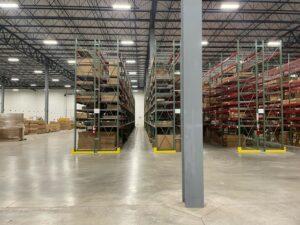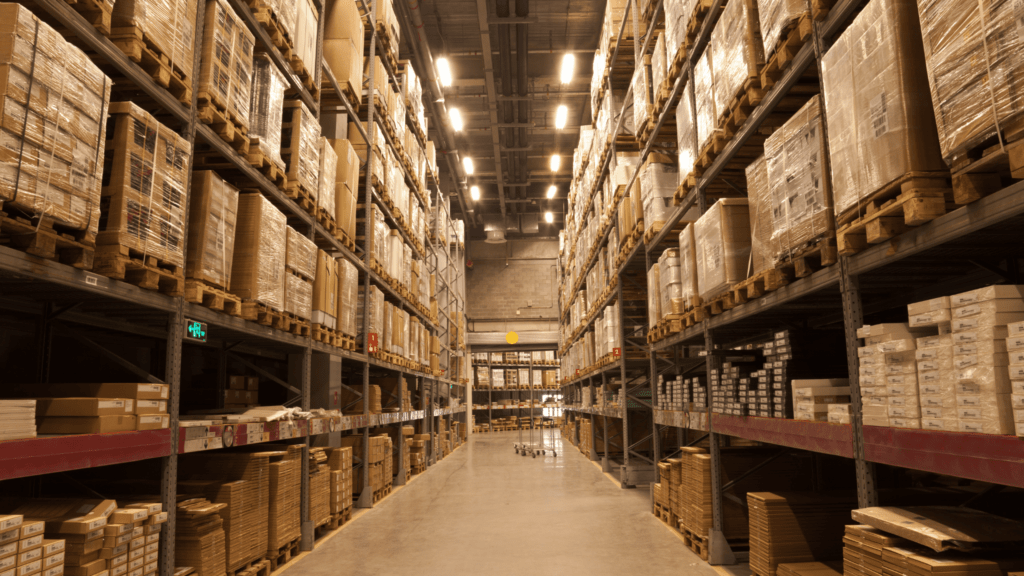
Local Warehouse for E-Commerce: Strategic Locations Over Proximity
Expand Your ECommerce Fulfillment Center Local Warehouse for E-Commerce: Strategic

Partnering with a 3PL Reverse Logistics provider can make businesses more efficient. By working with a company specializing in this field, you can take advantage of their experience and resources.
This will help to streamline your operations and improve your bottom line. The reverse logistics industry is over 200$ billion large, and there is plenty of room for more.
This guide will explore what reverse logistics is, the benefits of partnering with a 3PL, and how to select the right provider for your business.
Keep reading to discover the true wonders of 3PL and how it might change your business.
Reverse logistics is moving goods from their final destination back to the supplier. This can include returning, repairing, or recycling products after being sold to consumers.
In many cases, reverse logistics is more complex and time-consuming than traditional supply chain operations. That’s why it’s essential to partner with a company with experience in this field that can help you manage your returns efficiently.
Furthermore, reverse logistics can have a significant impact on the environment. By recycling or repurposing products, businesses can reduce their carbon footprint and help preserve our natural resources. Besides, returning products to the supplier is often cheaper than disposing them in a landfill.
The term “reverse logistics” was first coined in the early 1990s, and the field has been increasing ever since. Furthermore, the Reverse Logistics Association (RLA) was established in 2001 to help promote and advance the industry.
Reverse logistics is a market of hundreds of billions, and it’s expected to grow even more in the years ahead. That’s because more and more businesses realize the benefits of reverse logistics and are looking for ways to improve their operations.
One of the main drivers of this growth has been the increasing focus on sustainability and environmental responsibility.
As consumers become more aware of the negative impact that manufacturing and consumerism can have on our planet, they are looking to reduce their carbon footprint. This is where reverse logistics comes into play, as it offers a way to recycle and reuse products instead of simply throwing them away.
Let’s take a look at an example of how reverse logistics can work in practice.
Company A is a retailer that sells products online and through brick-and-mortar stores.
When a customer buys a product, Company A ships it from their warehouse to the customer’s home or store. If the customer decides to return the product, Company A needs to receive it, process the return, and ship it back to the supplier. This can be a complex process with many steps that need to be coordinated efficiently.
By partnering with a provider specializing in reverse logistics, Company A can streamline this process and improve its customer service.
The provider will handle all returns processing, ensuring that products are handled and shipped back to the supplier quickly and efficiently. This allows Company A to focus on its core business and reduces the risk of errors or delays.
Reverse logistics is a complex process, but you can make it easy and efficient by partnering with the right provider. The provider can help you achieve your goals and improve your bottom line. So, what are you waiting for? Start looking for a partner today!
In today’s fast-paced market, reverse logistics has emerged as a critical component of supply chain management. It encompasses the processes involved in managing product returns, refurbishments, recycling, and disposal, ensuring that businesses can recapture value while minimizing environmental impact. As e-commerce continues to grow, so does the volume of returns, making efficient reverse logistics operations more important than ever (NetSuite).
Reverse logistics involves a series of activities required to retrieve a used product from a customer and either dispose of it responsibly or reintegrate it into the supply chain. This process stands in contrast to traditional forward logistics and plays a pivotal role in sustainability efforts, customer satisfaction, and cost management (Harvard Business Review).
A well-orchestrated reverse logistics strategy not only simplifies return processes for customers but also significantly reduces operational costs and helps retain business value. By understanding the dynamics behind reverse logistics, companies can maintain healthy inventory turns and optimize operating expenses, thereby enhancing overall profitability (Forbes; Deloitte).
Technology plays a crucial role in streamlining reverse logistics processes. From real-time tracking systems and automated return processing to data analytics for understanding return patterns, technology enables businesses to manage returns more efficiently and gain insights to reduce future return rates (Manhattan Associates).
The concept of a circular economy is closely tied to effective reverse logistics practices. By encouraging manufacturers to take back used materials and remake them for future sale, reverse logistics supports sustainability goals and fosters economic, environmental, and social responsibility (Taylor & Francis Online).
There are several benefits of partnering with a reverse logistics provider. By no means are the ones listed finally. There are plenty of other benefits that you will discover.
An excellent reverse logistics partner can help you streamline your operations and improve your turnaround time.
They will know how to handle returns efficiently and ensure that products get back to the supplier as quickly as possible. This is just an example of the many ways that a good partner can help to improve your efficiency.
Business efficiency is key to staying afloat. When a company can’t keep up with the demand or turn products around promptly, it will cost them money.
By partnering with a reverse logistics provider, you can provide better customer service.
The provider will take care of all the returns processing to focus on providing excellent customer support. This allows you to build stronger relationships with your customers and keep them coming back for more products.
Customer service is integral to any business, and by partnering with a reverse logistics provider, you can ensure that it is one of your strengths.
You can save money on staffing, equipment, and storage costs by outsourcing your reverse logistics needs. Additionally, you may be able to reduce your waste disposal expenses.
The cost savings will come in many forms, so it’s essential to partner with a provider who can meet your specific needs.
By recycling or repurposing products, businesses can reduce their carbon footprint and help preserve our natural resources.
Reverse logistics is not only good for the bottom line, but it can also be good for the environment. So, if you’re looking for ways to make your business more sustainable, reverse logistics should be one of your top priorities.
Any business that sells products can benefit from partnering with a reverse logistics provider. This includes companies of all sizes and industries.
In addition, there are several types of businesses that may have specific needs that require the help of a specialist provider.
Online retailers face unique challenges when it comes to returns. They need to handle large volumes of returns quickly and efficiently. An excellent reverse logistics partner can help them do this and improve their customer service.
Practically all online retailers will have to deal with returns at some point. Retail chargebacks are pretty standard. It’s essential to have a process in place that is quick and easy for customers.
Manufacturers of consumer products often have to manage large volumes of returns. They also need to quickly get products back into production so they can meet customer demand.
An excellent reverse logistics partner can help them do this and keep their supply chain running smoothly. Many manufacturers now outsource their entire reverse logistics operation to a specialist provider.
Software providers often have complex return processes that require expert handling.
An excellent reverse logistics partner can help them manage these returns and keep their customers happy. This often means implementing a return process that is easy for customers to use and straightforward.
Wholesalers often sell products that are used or damaged. They need a partner who can help them manage these returns and dispose of the products environmentally friendly.
Wholesalers are also responsible for getting products back to the supplier quickly to be replaced. An excellent reverse logistics provider can help them do this and keep their business running smoothly.
Retailers with multiple locations face unique challenges when it comes to reverse logistics. They need a partner who can help them coordinate returns between their different stores.
These companies need to get products back to the supplier to replace them quickly. An excellent reverse logistics provider can help them do this and keep their business running smoothly.
There are many benefits of partnering with a reverse logistics provider. If you’re not sure if 3PL is right for you, contact us, and we would be happy to discuss your specific needs.
If you’re not sure if partnering with a reverse logistics provider is right for you, there are several alternatives to consider.
You can manage your returns in-house or use a third-party logistics provider specializing in returns management protocol. Alternatively, you can outsource your entire reverse logistics operation to a specialist provider.
Each of these options has its benefits and drawbacks, so it’s important to weigh them carefully before deciding.
Some businesses choose to manage their reverse logistics in-house.
This option can be less expensive than outsourcing, but it requires staff with specialized knowledge and equipment. You also need enough storage space to handle all of the returned products.
Third-party logistics providers specializing in returns management can be a good option for businesses that don’t want to manage their reverse logistics in-house.
These companies have the knowledge and equipment to handle returns quickly and efficiently. They also often have relationships with suppliers and carriers, saving you time and money.
If you want someone else to take care of your entire reverse logistics operation, you can outsource it to a specialist provider. This option is the most expensive, but it comes with many benefits.
A good provider will handle all of the logistics for you, including shipping products back to the supplier and coordinating between different stores. They also often have experience dealing with complex returns processes.
Each of these options has its benefits and drawbacks, so it’s important to weigh them carefully before deciding. Contact us if you want more information about how partnering with a reverse logistics provider can benefit your business.
When selecting a reverse logistics provider, it’s essential to consider your specific needs and goals. Choosing the right provider is like choosing whether or not your logistics enterprise will work out.
You need to be cautious with your selection, and you can do so by looking for these attributes.
Ensure the provider is like Cinch Warehousing 3PL. They have different experience in the type of products you sell and the industry you operate in.
This is critical to ensure they understand the complexities of your returns process. Without experience, your provider may not be able to meet your expectations.
The provider should be located near your warehouse or distribution center to process returns quickly and efficiently.
In any case, the provider should have a nationwide or even international reach to manage returns from anywhere in the world. Besides, the closer the provider is to your customers, the faster they can get products back in their hands.
The provider should offer a wide range of services, including return processing, freight management, and recycling/repurposing.
This is as important as their experience and location. You don’t want to go to multiple providers for different services. It should all be available from one source.
The provider should use green practices whenever possible. This includes recycling products, using energy-efficient transportation methods, and reducing their carbon footprint.
Green practices are becoming increasingly important to consumers. They want to know that the products they’re buying not only meet their needs but also reflect their values.
The provider should offer excellent customer service with quick response times. They should answer all of your questions and address any concerns you have.
The goal is to feel confident that the provider can handle all of your reverse logistics needs. Also, they should be able to provide custom reporting that meets your specific needs.
The provider you select should be able to accommodate businesses of all sizes.
An enormous business is no different from a small business in reverse logistics. They both need a partner who can handle their volume of returns and process them quickly and efficiently.
The provider should have experience with the type of products you sell.
Also, they should be familiar with the regulations that apply to those products. For example, if you sell hazardous materials, the provider should know how to handle them safely and dispose of them.
Make sure the provider has a presence in your area or is willing to expand into your market. Without this, they may not provide the level of service you expect. They may not be able to service your customers at all.
By taking these factors into account, you can find a provider like Cinch Warehousing 3PL that meets your unique needs and helps you succeed in reverse logistics.
When looking for a reverse logistics provider, it’s essential to avoid making these common mistakes. Read on to discover the most common ones that will ruin your search.
Make sure you know what you need from a provider and can articulate your requirements. This means knowing the type of products you sell, the volume of returns you expect, and your goals for reverse logistics.
It would help if you were concrete with what you are looking for and aware of a provider’s capabilities to the table.
Ask the provider plenty of questions to ensure they are a good fit for your business. In essence, you should be trying to answer these questions.
These are just some examples. By no means is this list exhaustive.
Don’t limit your search to the first few providers you come across.
Take the time to research your options and compare their services and pricing. Without looking through all of the possibilities, you severely limit your chances of finding the best provider for your business.
Some providers may use aggressive or misleading marketing tactics to win your business.
Don’t let yourself be swayed by exaggerated claims or promises that are impossible to keep. Do your research and make sure you are fully informed before deciding.
Make sure the provider you select has experience handling the type of products you sell. Choosing a provider without any knowledge can be a costly mistake. This is quite self-explanatory, but if you are looking for an experienced provider, be sure to do your due diligence.
A provider without experience is as bad as no provider at all.
Reverse logistics is more complex than traditional supply chain operations. Make sure you partner with a company that understands this and can help you manage your returns efficiently.
Furthermore, the provider should have a detailed understanding of your specific needs and provide custom solutions that fit your business.
Now that you’ve partnered with a reverse logistics provider, optimizing your process and making the most of their services is essential. In fact, without properly optimized logistics in your business, you might as well no longer use them.
If you’re struggling with reverse logistics optimization, check out these simple but effective processes.
The provider you select should work with you to develop a process plan that meets your specific needs. This plan should include the steps involved in returning and exchanging products and the expected turnaround time.
Not to mention, a process plan can help improve communication between your company and the provider, leading to a smoother operation overall.
Also, make sure to set and enforce Service Level Agreements (SLAs) with your provider to ensure they are meeting your expectations. We know first hand what it takes to deliver personalized service for our clients. We literally making supply-chain a Cinch.
A good provider will offer technology solutions that help you streamline your reverse logistics operations. This technology can include software for managing returns, tracking inventory, and more. Inventory management solutions are something to look into.
In addition, the provider should offer support for integrating their technology with your existing systems. This means you can continue using the tools you’re familiar with while utilizing the provider’s capabilities.
As more and more companies focus on sustainability, reverse logistics will become an increasingly important business.
By partnering with a provider specializing in green practices, you can streamline.
Make sure you have a system in place for communicating with your provider. This should include regular updates on the status of returns and exchanges, as well as any issues that may arise.
Also, it is essential to work with your provider to develop a clear understanding of their services and expectations. By doing so, you can ensure that your reverse logistics operations are running smoothly and efficiently.
What do you hope to achieve with reverse logistics? Is your goal to reduce expenses, improve customer service, or have a minimal environmental impact? By defining your goals, you can create a plan that outlines how the provider can help you meet them.
Besides, following these tips, you can increase efficiency in the reverse logistics process and improve your overall bottom line.
There are a lot of benefits to partnering with a reverse logistics provider, and by taking the time to find the right one, you can enjoy these benefits for years to come.
Once you’ve defined your goals, establish procedures for how the provider will handle returns and exchanges. This will ensure that products get back to the supplier as quickly as possible and without glitches.
In any case, it’s essential to partner with a reverse logistics provider who understands your unique needs and can help you achieve success in this complex area of supply chain management.
Make sure all of your staff know the procedures and know how to use the provider’s systems. This will help to ensure a smooth transition and avoid any confusion or delays.
Furthermore, it’s essential to stay on top of changes in the marketplace and update your process plan as needed.
There’s also a lot of value in keeping an open line of communication with your provider so they can continue to help you optimize your reverse logistics process.
A third-party logistics provider can be an excellent resource for companies to improve their reverse logistics operations. By partnering with a provider specializing in this area, you can take advantage of their expertise and technology solutions.
In addition, it is essential to establish clear communication channels and procedures so that the partnership runs smoothly.
Finally, make sure all staff are adequately trained on using the provider’s systems. By following these tips, you can optimize your reverse logistics process and improve your company’s bottom line.
Get in touch with us now to discover how Cinch 3PL Warehousing services can assist you in your reverse logistics journey. With locations across the U.S., we have what you need to store, ship and manage your inventory processes. We’ve been doing this for over 32 years and our boutique experience is changing supply-chain management.

Expand Your ECommerce Fulfillment Center Local Warehouse for E-Commerce: Strategic

Cinch 3PL Warehousing emerges as a pivotal force in the

Denver 3PL solutions give businesses a gateway at the base of the Rockies and with perfect proximity as a Denver Airport warehouse. Learn how Denver has gone from boom to 3Pl explosion in Denver.
Our team of 3PL experts is making logistics easy with local & global shopping cart to delivery solutions.
Copyright © Cinch Warehousing. All rights reserved.
Stay Connected to Cinch 3PL for the Latest Logistics, Supply Chain & 3PL Updates.
By filling out this form, you agree to receive marketing communication from Cinch Warehousing.
You can unsubscribe at any time.